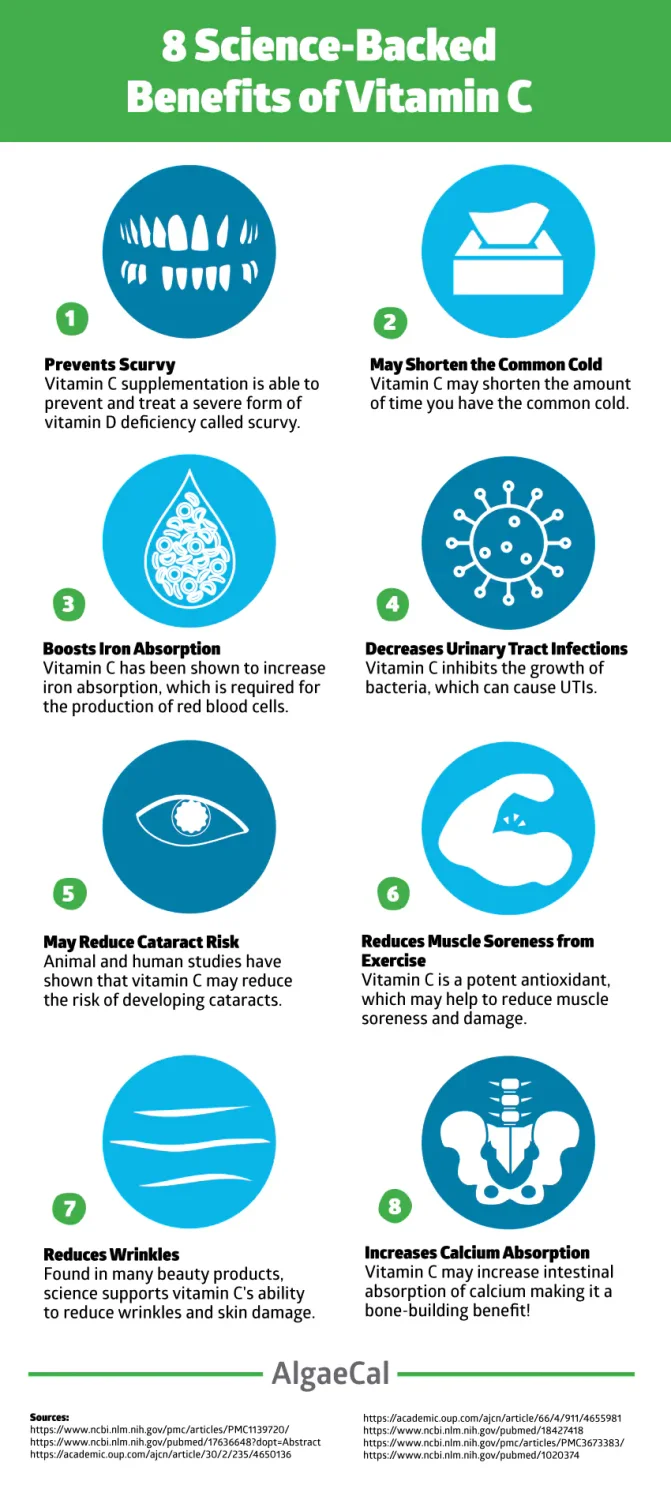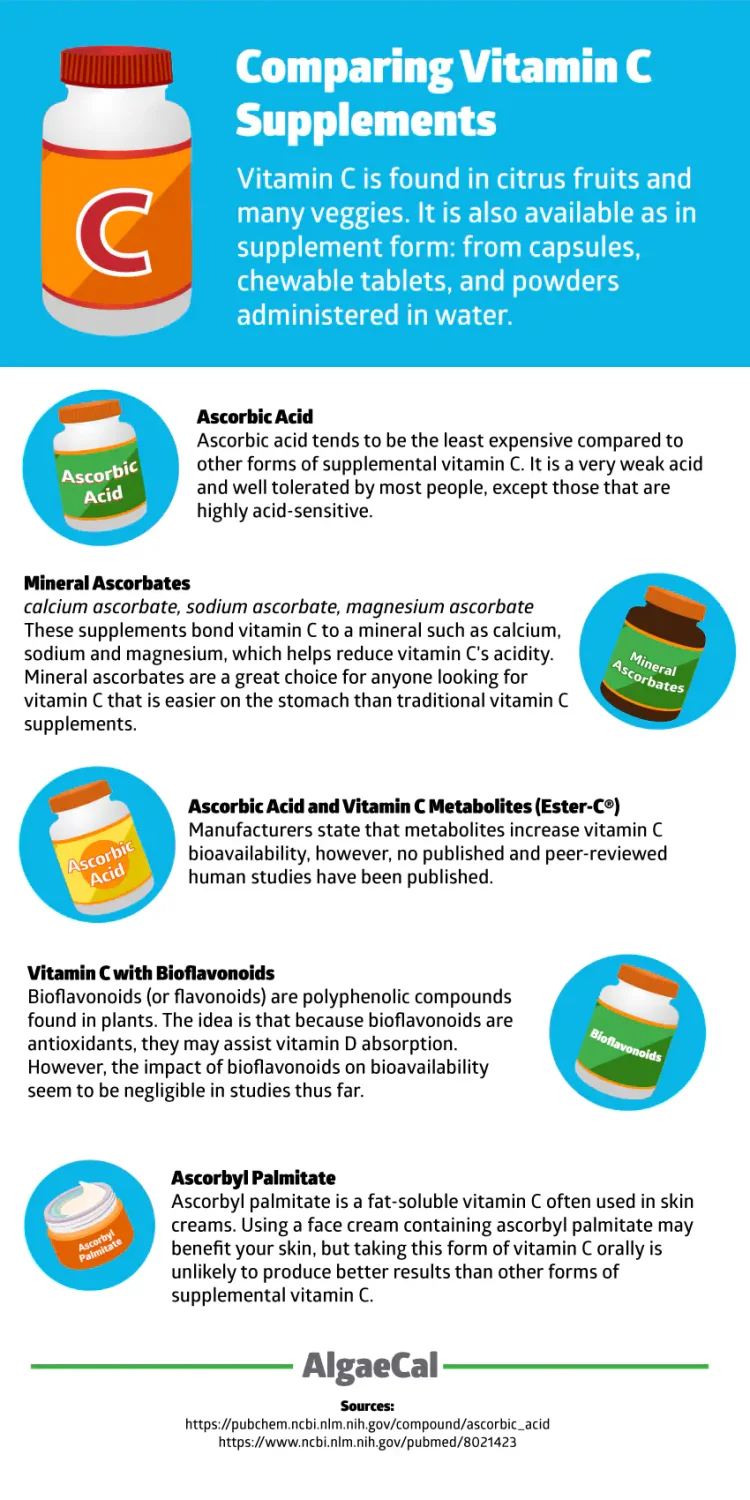The Ultimate Guide to Vitamin C

Only one of the most important essential vitamins there are!
Vitamin C (or ascorbic acid to give it its’ fancy name) is a powerful antioxidant found naturally in citrus fruits and many vegetables. Vitamin C is referred to as an essential vitamin because it’s not produced in the body. That means that a person’s diet is the only way to get it.
Why Do You Need Vitamin C?
Vitamin C is vital for many reasons. It’s needed to form collagen in fibrous tissues, teeth, and bones. And there’s even research to suggest that vitamin C can help to protect us from a variety of cancers.
How? By disarming the two major types of free radicals.
Free radicals are unpaired atoms that can form when oxygen interacts with certain molecules. These rogue atoms are highly volatile and can be destructive to DNA, protein, and cell membranes they contract. Cancer, Parkinson’s Disease, and aging are all linked to free radicals. But luckily, the body is able to defend itself with antioxidants like vitamin C, beta-carotene, vitamin E, and lutein.
Nowadays, it’s rare to be deficient in vitamin C. But evidence suggests that many people still don’t get enough of it.
The Signs and Symptoms of Vitamin C Deficiency
A well-known symptom of severe vitamin C deficiency is scurvy. The disease is a result of 60–90 days of vitamin C deficiency. But scurvy is a rarity in most developed countries, as there is plenty of vitamin C-rich produce available.
3 Ways Vitamin C Benefits Your Bones
Puts the Breaks on Inflammation
Vitamin C’s direct antioxidant actions protect against bone-destroying chronic inflammation. Regardless of its source(s), chronic inflammation excessively activates osteoclasts — cells that break down and absorb bone during remodeling — and causes bone loss. So vitamin C’s antioxidant actions provide essential protection for our bones.
Restores Glutathione
The antioxidant glutathione is integral in the body’s antioxidant and detoxification defenses. When there are insufficient levels, irreversible cell damage — resulting in cell death — can occur.
As we age, our ability to produce glutathione declines, but our need for it increases.
In women, glutathione requirements increase, particularly after menopause. Postmenopausal women use up their glutathione much quicker due to the loss of estrogen. Estrogen has many anti-inflammatory effects, including boosting our production of glutathione and other key antioxidant enzymes.
The drop in estrogen production that occurs with menopause results in an increase of active free radicals. In turn, there’s an increase in the production of osteoclasts and bone resorption. Studies on rats, however, show that vitamin C increases glutathione levels and can reverse this scenario.
Collagen Formation
Vitamin C’s anti-inflammatory activities ensure its place as an essential bone-health nutrient. But it has many other important bone-building actions too.
Vitamin C is vital to collagen development. And since more than 90% of the protein in bone is made from collagen, vitamin C is an essential nutrient for healthy bone.
Vitamin C also stimulates the production of mesenchymal stem cells (MSMs). MSMs cells are produced in our bone marrow and can develop into different types of cells, including cartilage, muscle, and fat cells, as well as bone-building osteoblasts.
Want to learn more about collagen? Check out our post: A Vegetarian’s Guide to Collagen and Healthy Bones.

Vitamin C and Bone Health: Research Roundup
There have been many studies to assess vitamin C’s importance for bone health. Most have involved both men and women over the age of 60 and postmenopausal women — not surprising since osteoporosis and the incidence of osteoporotic fracture are highest within these groups. Virtually all studies report significant beneficial effects of vitamin C on bone mineral density and/or risk of fractures.
Vitamin C is highly protective of men’s bones
Vitamin C helps maintain BMD and protects against bone loss in postmenopausal women
Vitamin C, especially supplemental vitamin C, lowers risk of hip and other osteoporotic fractures
Vitamin C is as effective as resistance exercise in preventing postmenopausal BMD loss in the spine
Supplemental vitamin C exponentially lowers the rate of bone resorption each year
Vitamin C has a major impact on young girls’ ability to build bone
Plus, 8 More Evidence-Based Health Benefits of Vitamin C
Over the last decade, hundreds of studies have been conducted on vitamin C revealing its benefits.
The following are eight science-backed benefits of vitamin C:
1. Prevents Scurvy
2. May Shorten the Common Cold
3. Boosts Iron Absorption
4. Decreases Urinary Tract Infections
5. May Reduce Cataract Risk
6. Reduces Muscle Soreness from Exercise
7. Reduces Wrinkles
8. Increases Calcium Absorption

How Much Vitamin C Do You Need?
The Reference Daily Intake (RDI) is considered the daily dietary intake level of a nutrient considered to meet the requirements of 97–98% of healthy individuals in each gender group and life stage.
For vitamin C, the following levels are recommended:
Are Vitamin C RDIs Inadequate?
RDIs for vitamin C was set back in 1996 using healthy volunteers. But researchers aren’t convinced they’re on par with the actual optimal intake, which many believe to be much higher.
Vitamin C gets used up much quicker during periods of acute illness, as well as chronic inflammation. Chronic, low-grade inflammation, which affects the majority of people over the age of 50, also plays a major role in osteoporosis. This further indicates that the RDI provides less than optimal support for healthy bones. The tolerable upper limit for vitamin C is 3,000 mg/d, but the research evidence suggests that intakes up to 4,000 mg/d are well tolerated in the general population.
Recent studies show between 10–17% of the US population is vitamin C deficient. This isn’t surprising given the number of very common factors that increase our risk of vitamin C deficiency, which we’ll learn more about in the next section.
What Increases Your Risk For Vitamin C Deficiency?

Best Food Sources of Vitamin C
You’ll find that the top vitamin C food sources are all plant foods. While citrus food may be the most common association, there are a whole host of excellent sources of vitamin C.
Acerola Cherry, also known as Barbados cherry, is one of the highest food sources of vitamin C. One cup provides a whopping 1,644 mg! But this berry is most commonly found in supplement form because it decomposes within five days of harvest!
The following are the top food sources of vitamin C:
Foods Richest in Vitamin C
What to look for in a Vitamin C Supplement
Vitamin C is available in a number of forms:

Ascorbic acid
Ascorbic acid is by far the least expensive supplemental form of vitamin C. Ascorbic acid is very weak and is well tolerated by most people, except those who are highly acid-sensitive. These people may experience gas or loose stools when taking larger amounts. This reaction can easily be prevented by taking three to six smaller doses throughout the day, ideally with meals or a snack.
And multiple small doses are a good idea for all of us, as fractional absorption of vitamin C decreases as the amount consumed at one time increases. When 200 mg is consumed, 100% is absorbed. As the dose increases, the amount of vitamin C absorbed decreases: when 1,250 mg is taken all at once, less than 50% is absorbed.
Mineral ascorbates
Mineral ascorbates offer the benefit of being highly unlikely to cause gastrointestinal distress, as they’re not acidic. They contain ascorbic ions rather than ascorbic acid. The ascorbate ions are bound to a mineral, typically calcium, sodium, or magnesium. These ions and their accompanying mineral are released in the stomach when they come into contact with stomach acid during digestion. Stomach acid then converts the ascorbate ions into ascorbic acid, readying the acid and mineral for absorption.
Because of the stomach acid-neutralizing effect of proton pump inhibitors, if you’re taking one of these drugs, you may not be able to effectively digest and absorb vitamin C from a mineral ascorbate. One capsule of a proton pump inhibitor will prevent stomach acid production for up to 24 hours.
Ascorbic acid supplements are 100% vitamin C. So the amount shown on the label per capsule is the amount of vitamin C provided. However, mineral ascorbate supplements differ slightly in the amount of mineral and vitamin C they contain. You’ll need to check the label to see precisely what you’re getting.
AlgaeCal Plus contains 50 mg of calcium ascorbate (84% of your Daily Value) in a daily dose of 4 veggie capsules. While it shouldn’t be your only source of vitamin C throughout the day, it adds to your total daily intake. It’s also clinically supported to increase bone mineral density safely and naturally in three human clinical studies. Vitamins and minerals work together for your bones and your health and AlgaeCal Plus allows them to do so. Not only does it contain plant-based calcium, but magnesium, vitamins K2, D3, C, boron, and trace minerals in their proper proportions — the way nature intended.
Ascorbic acid with vitamin C metabolites (Ester-C®)
One ascorbic acid supplement with vitamin C metabolites is available. Marketed as Ester-C®, it contains calcium ascorbate accompanied by small amounts of compounds claimed to increase the bioavailability of vitamin C. However, the only published study in humans checking this assertion found no differences in absorption or urinary excretion of vitamin C between Ester-C® and inexpensive ascorbic acid tablets.
Vitamin C with bioflavonoids
In animal studies, vitamin C’s absorption and transport to organs is significantly increased by bioflavonoids such as hesperidin, rutin, and catechin, which are naturally present in flavonoid-rich fruits and vegetables. The reason for this is thought to be that bioflavonoids have antioxidant effects themselves and thus spare vitamin C, increasing its availability. However, in some animal studies, bioflavonoids actually interfered with vitamin C’s binding to its transporters in the bloodstream, thus lessening its bioavailability. Plus, in contrast to the animal studies, human studies have shown little difference between the bioavailability of synthetic vitamin C and that from different fruits, fruit juices, and vegetables. Overall, the research suggests that when supplementing with vitamin C, we can save money by simply using inexpensive ascorbic acid in tablet or powder form.
Ascorbyl palmitate
Ascorbyl palmitate is a vitamin C ester. This means ascorbic acid is tied to a fatty acid, creating a fat-soluble vitamin C. Fat-soluble vitamin Cs are often used in skin creams. Vitamin C is not normally available in a fat-soluble form; that’s the domain of the fat-soluble antioxidants, like vitamin E. Applying a face cream containing ascorbyl palmitate may be beneficial for your skin, but taking this form of vitamin C orally is unlikely to produce better results than other forms of supplemental vitamin C.
Vitamin C Safety Issues
Vitamin C supplementation has been intensively studied, so we have a robust database confirming that vitamin C supplements are safe for the general population. Because of vitamin C’s antioxidant and immune boosting effects, many people consume seemingly high quantities of vitamin C. The amounts people often supplement with are above the current recommended intakes, but could actually be well below optimal health intakes.
Numerous studies of vitamin C supplementation have provided no substantive evidence to support concerns about safety other than occasional gastrointestinal upset or mild diarrhea.
Reviews of the medical research conducted by different authors have consistently found that vitamin C is safe at intakes of 2,000 mg/d. The upper limit for vitamin C, set primarily to avoid diarrhea, is 3,000 mg/d.
The list of hypothetical adverse effects you are likely to see on various websites, including claims that vitamin C might increase the chances of forming kidney stones, increase risk of gout, cause excess iron absorption, reduce vitamin B12 concentrations, or even induce “rebound” scurvy, have all have been found to have no substantive basis.
According to the most current review of the research, published by the Linus Pauling Institute at Oregon State, “There is no reliable scientific evidence that large amounts of vitamin C (up to 10 grams/day in adults) are toxic or detrimental to health.”
Find the right AlgaeCal for your bone-health needs.
Don’t know where to start? Take our quiz to receive a customized recommendation. Take Our Quiz.
